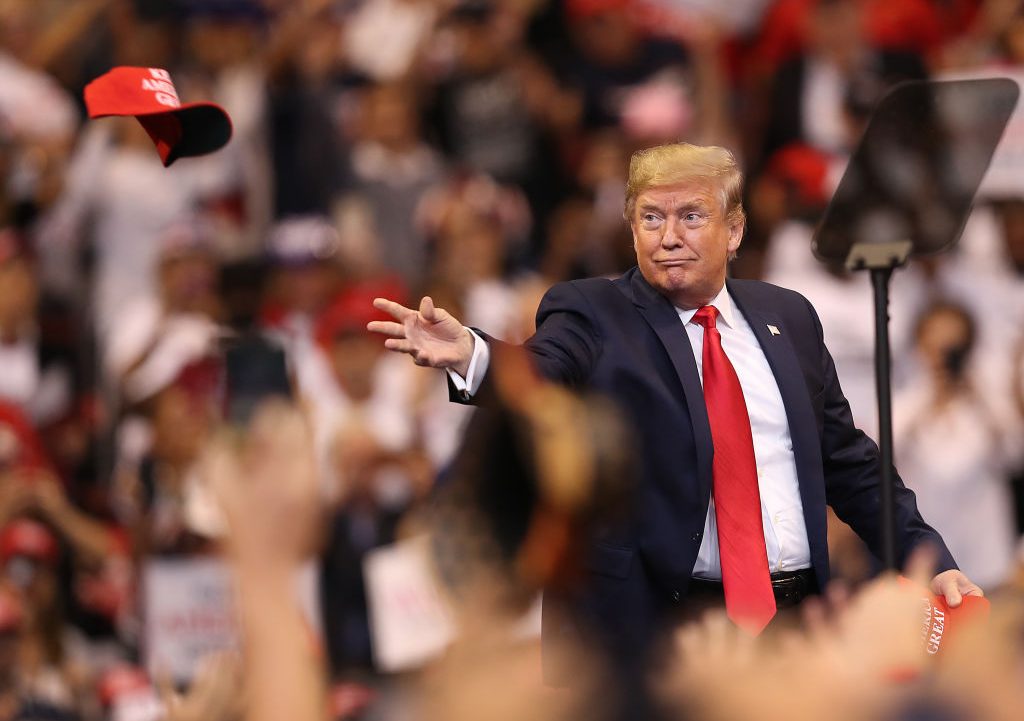
For China, at least, US President Donald Trump is the gift that keeps on giving. His calamitous response to the Covid-19 pandemic has made China, whose government mishandled the initial outbreak in January, look like an exemplar of effective governance. Moreover, Trump’s ‘America first’ foreign policy has alienated traditional US allies, making it difficult to build a broad coalition to counter Beijing.
To be sure, Trump has delivered painful blows to Chinese President Xi Jinping. His trade and technology wars are demolishing US–China commercial relations, and his administration’s support for Taiwan has infuriated Chinese leaders. But as American voters prepare to head to the polls next week, Trump seemingly has one more gift to give to Xi: an election meltdown.
In the run-up to this referendum on his presidency, Trump has repeatedly refused to commit unequivocally to accepting its outcome. He has used his presidential bully pulpit to try to delegitimise voting by mail, and even hinted that the US Supreme Court, which now has a 6-3 conservative majority following the Senate’s confirmation of Trump nominee Amy Coney Barrett, would intervene and presumably deliver him a second term.
Opinion polls point to a clear victory for Trump’s Democratic challenger, former vice president Joe Biden. But the presidential race is likely to tighten, and—even if Trump trails Biden in the overall popular vote—the outcome in the battleground states that will determine the winner in the electoral college could be too close to call on election night. That would create an opening for Trump—and the Republican Party—to use their control of many levers of power to cling to the White House.
Although the nightmarish scenarios of a drawn-out post-election battle vary, any of them would irreparably damage America’s democracy—to the delight of the Chinese Communist Party.
At the ideological level, a US election meltdown featuring bitter political clashes and endless litigation would be a propaganda bonanza for the CCP. Chinese leaders would point to America’s political turmoil as a symptom of its terminal decline. Trump’s incompetent management of the pandemic has already made America an object of pity around the world. If he follows through on his threats to defy the will of US voters, the appeal of American democracy to people living under dictatorships, including in China, would be eviscerated. If heavily armed far-right militia groups engage in large-scale voter intimidation and deadly clashes occur around the US on 3 November, Chinese state-controlled media will gleefully beam such apocalyptic scenes into every Chinese household.
China could benefit even more if Trump emerges as the winner from a contested election—a likely prospect given the archaic and complex rules governing US presidential elections and the Supreme Court’s potentially decisive role.
Although a second-term Trump administration would further tighten the military and technological screws around China, the continuation of his presidency would nonetheless be a boon to Xi’s regime. For starters, a majority of Americans will regard Trump as an illegitimate president if he loses the popular vote—as now seems all but certain. Worse still, the country could be plunged into political civil war if he wins a second term through massive voter suppression, dubious political manoeuvres by Republican-controlled legislatures in battleground states such as Pennsylvania, Wisconsin and Florida, partisan rulings by Trump-appointed judges and justices, and outright abuse of executive authority. In the latest example of the latter, Trump has been calling on the Justice Department to investigate both Biden and his son, Hunter, after a recent New York Post report prompted unsubstantiated allegations concerning Hunter Biden’s business dealings.
Although both Democrats and Republicans regard China as America’s most serious threat, one has to wonder how the US could effectively wage a new cold war against China while engulfed in a political civil war and led by a chief executive whom more than half the electorate regards as illegitimate. At the very least, further intensification of partisan polarisation would make it impossible for America to rebuild its strength at home through catch-up investments in healthcare, education, scientific research, clean energy and infrastructure—all of which are urgently needed to sustain the country’s competitive advantage over China.
Internationally, a second-term Trump administration ushered in by non-democratic means would widen the gulf between the US and its traditional liberal democratic allies. The continuation of Trump’s ‘America first’ foreign policy would make it harder for the US to forge a broad anti-China coalition. With the erosion of American democracy likely to accelerate in a second Trump term, US diplomats would find it challenging to persuade other Western leaders that they should join America’s autocratic strongman in an ideological crusade against China’s autocratic strongman.
Conventional wisdom holds that China’s leaders would prefer a Biden victory. Although China might then face a more unified West, a Biden administration would be more predictable and open to cooperation on issues like climate change and global public health. But the prospect of an America paralysed by a crisis of political illegitimacy at home and estranged from its allies abroad may be even more attractive to the CCP.

